Why Does My Cat Want Me To Watch Him Eat?
Have you ever noticed your feline insists on having you right next to her during mealtime? Don’t be surprised because it’s usual behavior for them. It’s known as “affection eating.” So now the question intrigues your mind why does my cat want me to watch him eat?
Well, many cats enjoy having their human companions around while they eat. It’s because cats are social creatures who find comfort and security when you’re nearby. It can also be a way for them to bond and show trust. Some kitty just like the attention and interaction during mealtime, expressing their affection and desire for companionship.
Are you interested in understanding why your cat seeks your presence while eating? Look into this informative article to explore various explanations and gain a deeper insight into your feline companion’s behavior.
Want to learn more about cats:
8 Reasons Why Do Cats Want Their Owners to Watch Them Eat?
It’s not often a problem to have a cat that appreciates having its every move watched as they eat. But sometimes, getting them to eat on their own is difficult.
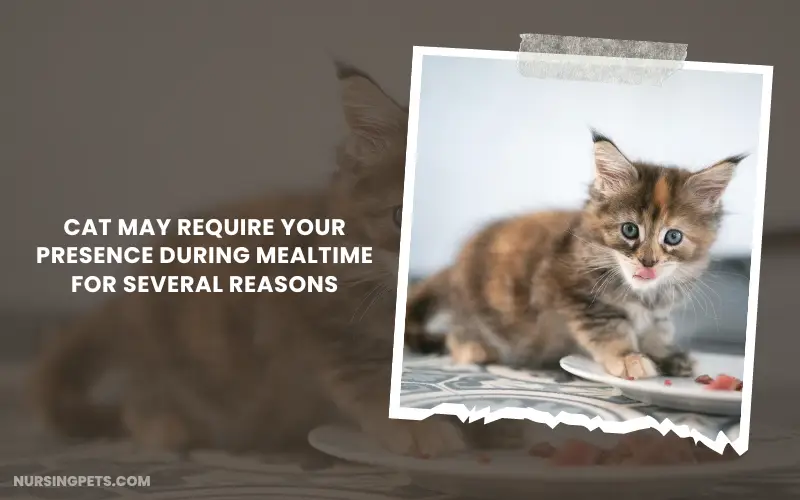
Let’s investigate why these creatures insist on having you there at every meal. So, we can understand this behavior.
1. Social Eaters: Reflecting Natural Behavior
Cats form strong bonds with other cats as they are social creatures. Eating together in groups provides stability and reduces stress. Domesticated pussycats may exhibit this social behavior with owners, finding comfort and companionship while eating. Their presence can make them feel less lonely.
2. Desiring Approval and Validation: A Trustworthy Witness
Felines seek confirmation and acceptance from their owners, often displaying affectionate behaviors to gain attention. Having owners watch them eat may indicate a desire for affirmation and acceptance of their choices, especially if they have recently changed their diet or are selective eaters.
3. Craving Attention: Captivating Your Focus
It’s also likely that cats just like being petted while their owners see them eating. Being watched by their owners as they eat; may help cats, who are known to be attention seekers, obtain the attention they need.
4. Showing Trust and Affection: Sharing Vulnerable Moments
The trust and devotion your cat is displaying for you might also be the cause. A feline may be more inclined to seek out the companionship of someone they trust when they are vulnerable, such as while they are feeding.

5. Creating a Safe Space: A Sense of Security
When cats eat, their attention is solely on their food, making them defenseless. In new or stressful situations, they can feel restless and anxious due to their delicate nature. Being near their owner can encourage them and make them feel safe.
However, do not forget that not all cats like being watched while eating. Some prefer privacy. Respecting their boundaries and giving them space is required.
6. Illness: Seeking Comfort and Support
In some cases, a cat’s desire to be watched while eating may be an indication of underlying health issues. Illness can make them feel helpless and uncertain, and having their owner nearby during mealtime provides a sense of comfort and support.
7. Habit: Established Routine and Familiarity
Cats are creatures of habit, and their desire for you to watch them eat may simply be a result of an established routine. If you’ve consistently been present during their meals, they may come to expect and seek your company as part of their feeding ritual.
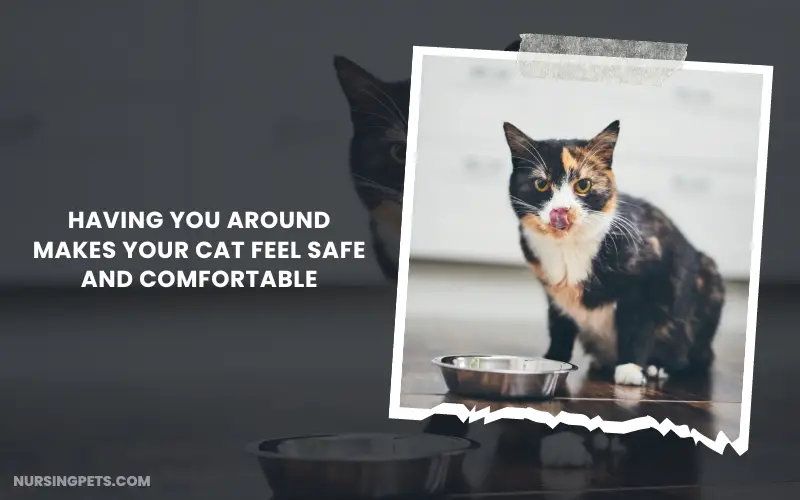
8. Love: Sharing Moments of Connection
When a cat invites you to watch them eat, it’s a beautiful display of love. Cats develop strong emotional bonds with their owners by including you in their mealtime. Treasure these moments of connection and respond with love, care, and attentiveness.
In case a cat wants its owner to watch them eat, it signifies a complex interplay of social instincts, trust, attention-seeking, and affection. By understanding and responding to these motivations, we can nurture a stronger bond with our feline companions.
Should You Watch Your Cat Eat?
The answer to whether you should observe your cat as it eats depends on the feline in question. Some felines are “social eaters” that do better with the company at mealtime. Others just like to dine in silence.
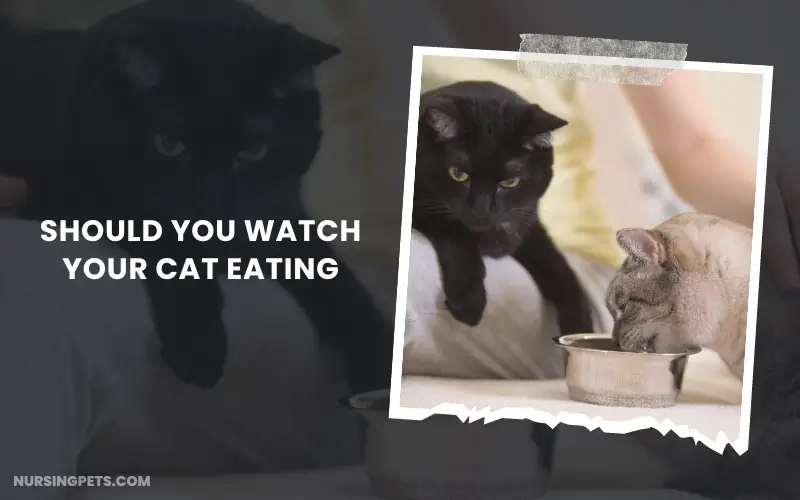
There’s no danger in watching your kitty eat if it doesn’t mind being observed. If your cat displays indications of discomfort or tension, including avoiding eye contact or not finishing their meal, it may be best to give them space and let them eat alone.
Signs That Your Cat Wants You to Watch Them Eat
Cats, with their enigmatic personalities, sometimes demand an audience during their mealtime. Pay attention to these authentic cues, and you’ll unlock a deeper connection with your furry companion.
1. Vocalization: The Symphony of Meows
When your cat wants you to watch them eat, they become quite vocal about it. Listen for a unique medley of meows and purrs, expressed with a slightly higher pitch and an unmistakable sense of urgency. These vocalizations are their way of grabbing your attention and inviting you to join the feast.
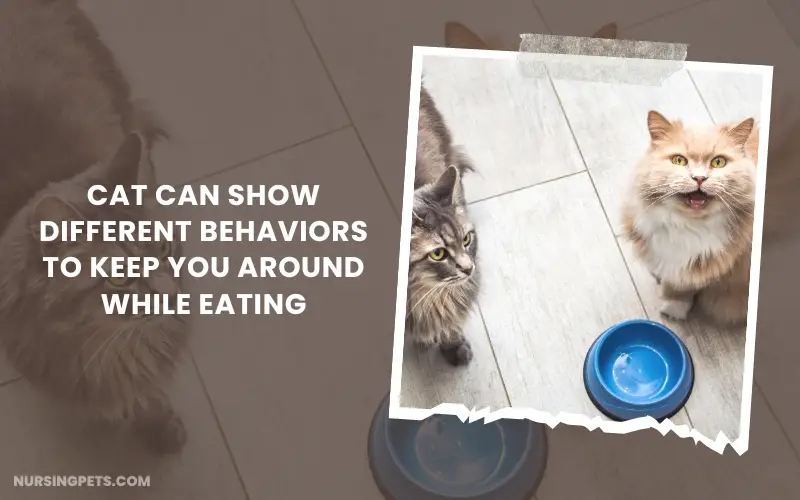
2. Eye Contact: Captivating Gazes
A key indicator that your cat desires an audience during their meals is the intense eye contact they establish with you. While munching on their food, they’ll intermittently lock eyes with you, seeking validation and assurance that you’re witnessing their regal dining performance.
3. Tail Flicks: Communicating Excitement
Notice how your cat’s tail sways and flicks with excitement as they prepare to eat? This playful tail language is an unmistakable signal that they want you to be part of their mealtime routine. Pay attention to their tail movements as it communicates their desire for your presence.
4. Paw Gestures: A Welcoming Gesture
Observe your cat’s paws during their meals. If they frequently reach out towards you or gently tap the ground around them, consider it an open invitation to participate. These subtle paw gestures indicate their desire to share their eating experience with you.
5. Mealtimes at Common Gathering Spots
If they consistently gravitate towards communal areas where family members usually gather, it’s a strong indication that they want you to watch them eat. These spots hold sentimental value for them.

6. Chirping and Trilling: Unique Vocal Expressions
Beyond meowing, cats employ diverse vocalizations to convey their emotions. They often incorporate chirping or trilling sounds into their repertoire when they want you to watch them eat.
7. Purring: Audible Contentment
While cats purr for various reasons, the presence of a soothing purr during mealtime indicates their satisfaction and contentment with your company. If your cat’s purring becomes particularly pronounced as they dine, it’s a genuine sign that they feel secure in your presence.
8. Rubbing Against You: Marking Their Territory
A telltale sign that your cat wants you to witness their meals is when they actively rub against you during this time. By marking you with their scent, they claim you as part of their social group and invite you to share in their daily rituals.
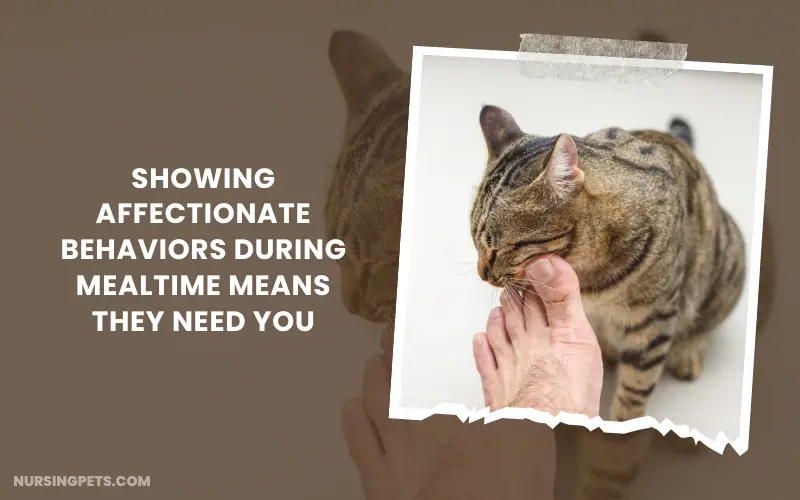
9. Pawing at Their Bowl: Nonverbal Communication
One of the most direct ways your cat communicates their desire for your presence during their meals is by pawing at their food bowl. This nonverbal cue signifies their wish for interaction, as they want you to observe them partake in this essential aspect of their daily routine.
10. Body Language
Cats’ body language is a common form of communication. Your cat may prefer you close by when they feed if they are calm and contented while doing so. Your feline may prefer eating alone if it acts stiff or frightened at mealtime.
11. Following You
Your cat may want you to watch them eat if it follows you to the dish and stares up at you the whole time.
In the end, each pussy cat is an individual; thus, one cat’s solution may not work for another. To figure out whether your feline would want you to watch them eat or, if they would rather eat in peace, observe their eating habits and demeanor.
Why Watching Your Cat Eat Can Be Beneficial?
Watching our cats engage in their daily activities can be fascinating, whether chasing a toy, napping in a sunbeam, or even eating their meals. But did you know that observing your cat eat can be beneficial? Let’s talk about it now.
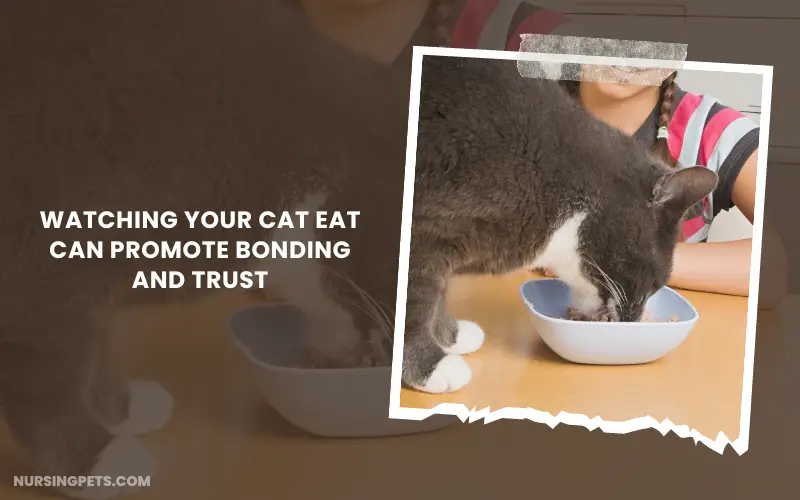
Promotes Bonding:
When you take the time to observe your feline while they eat, it creates an opportunity for bonding. As social creatures, some cats appreciate human presence during mealtime. Being present establishes trust and shows your cat that you care about them.
Monitors Health:
Cats are masters of hiding illness or discomfort. Watching them eat gives you valuable insights into their overall health. Changes in appetite, eating speed, or weight loss could be early signs of fundamental health conditions.
Enhances Nutritional Awareness:
Cats are obligate carnivores with unique dietary needs. By witnessing their eating patterns, you can assess if they’re consuming their food appropriately and in adequate amounts. This awareness helps ensure your cat receives proper nutrition and allows you to make informed decisions when choosing their diet.
Prevents Food-Related Issues:
Some cats may have specific dietary preferences or sensitivities. With careful observation of their eating behavior, you can identify any digestion problems related to certain foods. This knowledge empowers you to adjust your cat’s diet accordingly, avoiding illness or discomfort.

Provides Behavioral Insights:
Cats’ eating habits can also offer insights into their behavior. For instance, aggressive behavior around food may indicate resource guarding, while excessive meowing could signal hunger or anxiety. By paying attention to these cues, you can address any behavioral concerns.
Watching your feline eat may seem like a simple act, but it can have profound benefits for both you and your tabby friend. From fostering a deeper bond to monitoring their health and nutrition, observing mealtime habits allows you to be a more attentive and responsible cat owner.
What to Do When Your Cat Wants You to Watch Them Eat?
There are certain things you can do if your cat insists on having you there when they eat. That will make it more pleasant for both of you:
Create a Pleasant Dining Atmosphere
To ensure a pleasant dining experience for your cat, it’s advised to designate a serene, quiet space for their meals. Avoid placing their bowls near noisy appliances or busy areas of your home to minimize distractions and promote a peaceful atmosphere during their mealtimes.
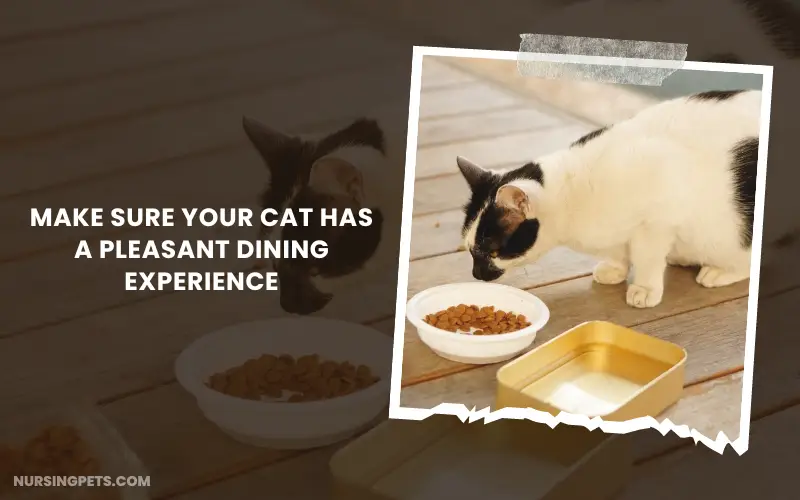
Watch From a Distance
Whenever your feline finds comfort in your presence during meals, take a moment to sit back and relax nearby, ensuring they can still see you. This creates a reassuring environment where your cat feels safe and trusted while eating, benefiting both of you in a mutually positive way.
Encouragement and Rewards
If you’re looking to encourage your cat to develop healthier eating habits, provide rewards as reinforcement for desired behavior. When introducing a new diet, consider rewarding your kitty each time they try a new meal, helping them adjust and fostering a positive association with the new food.
How to Get Your Cat to Eat When You Are Not Watching?
You may do a few things to make your cat feel at ease and encourage good feeding habits if they don’t eat unless you are present:
Move the Bowl of Food
Put the food dish in an area where there are more people if your cat enjoys eating in public. Food bowls are often placed in awkward or off-limits locations throughout the house, including the laundry room.
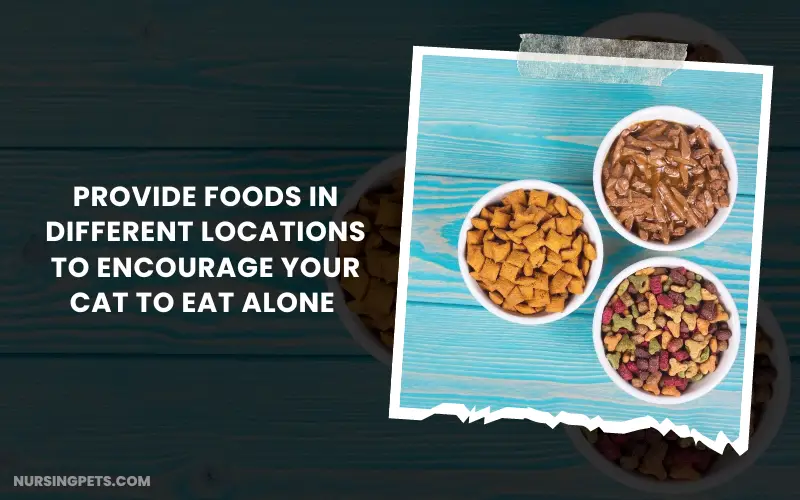
Try a different location, like your room or the kitchen. Try some waterproof pet rugs if you’re worried about creating a mess by moving the food dish. You should use this mat from Amazon, which I recommend.
You may use it to shield flooring from messed-up wet food and water spills.
Add More Food Bowl
To encourage your cat to eat when you’re not watching, try adding more food bowls in different locations. This allows them to choose a comfortable and private spot to eat. Ensure the bowls are easily accessible, clean, and stocked with fresh food.
Establish a Consistent Feeding Schedule
Cats like consistency, so maintaining a regular feeding schedule may make them feel safe and secure. Try to follow a regular feeding schedule and feed your feline at the same time every day.
Make Mealtime Pleasant
Make sure that your cat has a clean, comfortable, and distraction-free place to eat. Some cats can choose to eat at a spot in the home that is calm and seldom gets busy.
Gradually Wean Your Cat Off the Need to Watch You
If your kitty has become used to seeing you as they eat, consider gradually cutting down on your presence. As they eat, start by sitting closer to them for a briefer length of time and gradually move away. Your cat could become used to feeding on their own with time.

Consult With a Veterinarian
It’s vital to screen out any pre-existing medical condition that could be driving your cat’s strange feeding pattern. Make an appointment with your vet to evaluate your cat’s health and discuss if any treatment is needed.
Frequently Asked Questions
1. Why Does My Cat Want Me to Join Him in The Dining Room?
Your feline wants you to join them in the dining room because they perceive mealtime as a social event. Cats are known for their social nature, and having you nearby during meals provides them comfort, companionship, and a sense of security.
2. Why Does My Cat Want Pet Attention Before Meals?
Around meals, some cats may get anxious or stressed. Petting them might ease their tension and give them a feeling of security. Furthermore, some of them could just be looking for love and attention. Before they feed, you might pet them to provide them with the tactile touch they want.
3. Is It Normal for Cats to Want Their Owners to Watch Them Eat?
Cats’ desire for their humans to observe them as they eat is typical. It is a typical activity in cats and often indicates that they are gregarious animals.
Final words
I hope you now get why your cat wants you to keep an eye on her when she eats. They do so to express their social nature and to get their owners’ acceptance and affirmation. Training and fostering a closer relationship with your tabby may both benefit from watching them eat.
Establishing a schedule that works for you and your cat is essential if your feline wants you to watch them eat. Pay attention to their behavior and requirements.
References:
- https://animalpath.org/why-does-my-cat-want-me-to-watch-him-eat/
- https://www.sfspca.org/sites/default/files/documents/cat_affection-eaters.pdf
- https://www.thedodo.com/dodowell/why-does-my-cat-want-me-to-watch-her-eat

